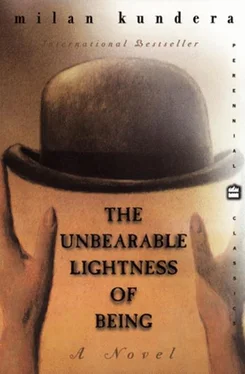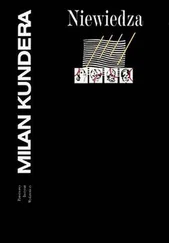Milan Kundera - The Unbearable Lightness of Being
Здесь есть возможность читать онлайн «Milan Kundera - The Unbearable Lightness of Being» весь текст электронной книги совершенно бесплатно (целиком полную версию без сокращений). В некоторых случаях можно слушать аудио, скачать через торрент в формате fb2 и присутствует краткое содержание. Жанр: Современная проза, на английском языке. Описание произведения, (предисловие) а так же отзывы посетителей доступны на портале библиотеки ЛибКат.
- Название:The Unbearable Lightness of Being
- Автор:
- Жанр:
- Год:неизвестен
- ISBN:нет данных
- Рейтинг книги:3 / 5. Голосов: 2
-
Избранное:Добавить в избранное
- Отзывы:
-
Ваша оценка:
- 60
- 1
- 2
- 3
- 4
- 5
The Unbearable Lightness of Being: краткое содержание, описание и аннотация
Предлагаем к чтению аннотацию, описание, краткое содержание или предисловие (зависит от того, что написал сам автор книги «The Unbearable Lightness of Being»). Если вы не нашли необходимую информацию о книге — напишите в комментариях, мы постараемся отыскать её.
The Unbearable Lightness of Being — читать онлайн бесплатно полную книгу (весь текст) целиком
Ниже представлен текст книги, разбитый по страницам. Система сохранения места последней прочитанной страницы, позволяет с удобством читать онлайн бесплатно книгу «The Unbearable Lightness of Being», без необходимости каждый раз заново искать на чём Вы остановились. Поставьте закладку, и сможете в любой момент перейти на страницу, на которой закончили чтение.
Интервал:
Закладка:
Tereza could think of nothing but the possibility that the engineer had been sent by the police. And who was that strange boy who drank himself silly and told her he loved her? It was because of him that the bald police spy had launched into her and the engineer stood up for her. So all three had been playing parts in a prearranged scenario meant to soften her up for the seduction!
How could she have missed it? The flat was so odd, and he didn't belong there at all! Why would an elegantly dressed engineer live in a miserable place like that? Was he an engineer? And if so, how could he leave work at two in the afternoon? Besides, how many engineers read Sophocles? No, that was no engineer's library! The whole place had more the flavor of a flat confiscated from a poor imprisoned intellectual. Her father was put in prison when she was ten, and the state had confiscated their flat and all her father's books. Who knows to what use the flat had then been put?
Now she saw clearly why the engineer had never returned: he had accomplished his mission. What mission? The drunken undercover agent had inadvertently given it away when he said, Just remember that prostitution is a criminal offense. Now that self-styled engineer would testify that she had slept with him and demanded to be paid! They would threaten to blow it up into a scandal unless she agreed to report on the people who got drunk in her bar.
Don't worry, the ambassador comforted her. Your story doesn't sound the least bit dangerous.
I suppose it doesn't, she said in a tight voice, as she walked out into the Prague night with Karenin.
25
People usually escape from their troubles into the future; they draw an imaginary line across the path of time, a line beyond which their current troubles will cease to exist. But Tereza saw no such line in her future. Only looking back could bring her consolation. It was Sunday again. They got into the car and drove far beyond the limits of Prague.
Tomas was at the wheel, Tereza next to him, and Karenin in the back, occasionally leaning over to lick their ears. After two hours, they came to a small town known for its spa where they had been for several days six years earlier. They wanted to spend the night there.
They pulled into the square and got out of the car. Nothing had changed. They stood facing the hotel they had stayed at. The same old linden trees rose up before it. Off to the left ran an old wooden colonnade culminating in a stream spouting its medicinal water into a marble bowl. People were bending over it, the same small glasses in hand.
When Tomas looked back at the hotel, he noticed that something had in fact changed. What had once been the Grand now bore the name Baikal. He looked at the street sign on the corner of the building: Moscow Square. Then they took a walk (Karenin tagged along on his own, without a leash) through all the streets they had known, and examined all their names: Stalingrad Street, Leningrad Street, Rostov Street, Novosibirsk Street, Kiev Street, Odessa Street. There was a Tchaikovsky Sanatorium, a Tolstoy Sanatorium, a Rimsky-Korsakov Sanatorium; there was a Hotel Suvorov, a Gorky Cinema, and a Cafe Pushkin. All the names were taken from Russian geography, from Russian history.
Tereza suddenly recalled the first days of the invasion. People in every city and town had pulled down the street signs; sign posts had disappeared. Overnight, the country had become nameless. For seven days, Russian troops wandered the countryside, not knowing where they were. The officers searched for newspaper offices, for television and radio stations to occupy, but could not find them. Whenever they asked, they would get either a shrug of the shoulders or false names and directions.
Hindsight now made that anonymity seem quite dangerous to the country. The streets and buildings could no longer return to their original names. As a result, a Czech spa had suddenly metamorphosed into a miniature imaginary Russia, and the past that Tereza had gone there to find had turned out to be confiscated. It would be impossible for them to spend the night.
26
They started back to the car in silence. She was thinking about how all things and people seemed to go about in disguise. An old Czech town was covered with Russian names. Czechs taking pictures of the invasion had unconsciously worked for the secret police. The man who sent her to die had worn a mask of Tomas's face over his own. The spy played the part of an engineer, and the engineer tried to play the part of the man from Petrin. The emblem of the book in his flat proved a sham designed to lead her astray.
Recalling the book she had held in her hand there, she had a sudden flash of insight that made her cheeks burn red. What had been the sequence of events? The engineer announced he would bring in some coffee. She walked over to the bookshelves and took down Sophocles' Oedipus. Then the engineer came back. But without the coffee!
Again and again she returned to that situation: How long was he away when he went for the coffee? Surely a minute at the least. Maybe two or even three. And what had he been up to for so long in that miniature anteroom? Or had he gone to the toilet? She tried to remember hearing the door shut or the water flush. No, she was positive she'd heard no water; she would have remembered that. And she was almost certain the door hadn't closed. What had he been up to in that anteroom?
It was only too clear. If they meant to trap her, they would need more than the engineer's testimony. They would need incontrovertible evidence. In the course of his suspiciously long absence, the engineer could only have been setting up a movie camera in the anteroom. Or, more likely, he had let in someone with a still camera, who then had photographed them from behind the curtain.
Only a few weeks earlier, she had scoffed at Prochazka for failing to see that he lived in a concentration camp, where privacy ceased to exist. But what about her? By getting out from under her mother's roof, she thought in all innocence that she had once and for all become master of her privacy. But no, her mother's roof stretched out over the whole world and would never let her be. Tereza would never escape her.
As they walked down the garden-lined steps leading back to the square, Tomas asked her, What's wrong?
Before she could respond, someone called out a greeting to Tomas.
27
He was a man of about fifty with a weather-beaten face, a farm worker whom Tomas had once operated on and who was sent to the spa once a year for treatment. He invited Tomas and Tereza to have a glass of wine with him. Since the law prohibited dogs from entering public places, Tereza took Karenin back to the car while the men found a table at a nearby cafe. When she came up to them, the man was saying, We live a quiet life. Two years ago they even elected me chairman of the collective. Congratulations, said Tomas.
You know how it is. People are dying to move to the city. The big shots, they're happy when somebody wants to stay put. They can't fire us from our jobs.
It would be ideal for us, said Tereza. You'd be bored to tears, ma'am. There's nothing to do there. Nothing at all.
Tereza looked into the farm worker's weather-beaten face. She found him very kind. For the first time in ages, she had found someone kind! An image of life in the country arose before her eyes: a village with a belfry, fields, woods, a rabbit scampering along a furrow, a hunter with a green cap. She had never lived in the country. Her image of it came entirely from what she had heard. Or read. Or received unconsciously from distant ancestors. And yet it lived within her, as plain and clear as the daguerreotype of her great-grandmother in the family album.
Читать дальшеИнтервал:
Закладка:
Похожие книги на «The Unbearable Lightness of Being»
Представляем Вашему вниманию похожие книги на «The Unbearable Lightness of Being» списком для выбора. Мы отобрали схожую по названию и смыслу литературу в надежде предоставить читателям больше вариантов отыскать новые, интересные, ещё непрочитанные произведения.
Обсуждение, отзывы о книге «The Unbearable Lightness of Being» и просто собственные мнения читателей. Оставьте ваши комментарии, напишите, что Вы думаете о произведении, его смысле или главных героях. Укажите что конкретно понравилось, а что нет, и почему Вы так считаете.












